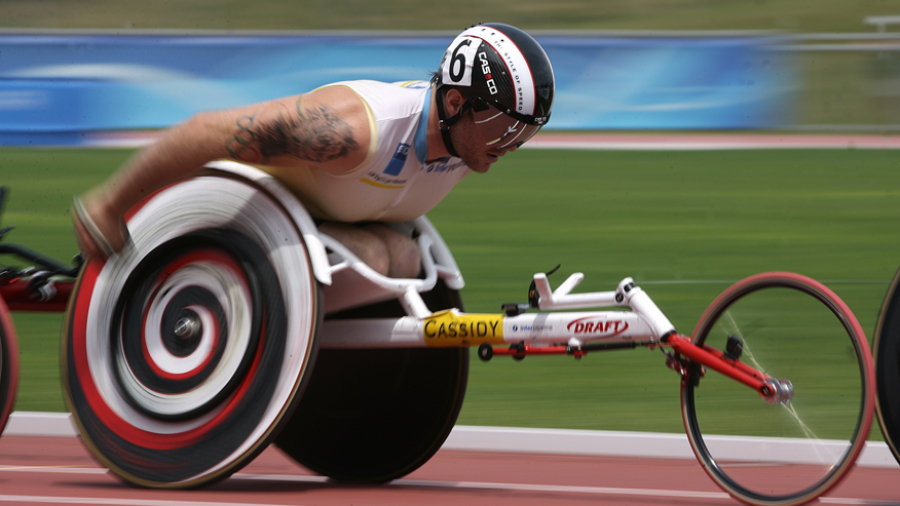After what Paralympian Josh Cassidy calls a “frustrating year” in 2013, the multi-Canadian record holder was ready to change the tides as he entered 2014.
Reflecting upon the past year, the ‘World’s Fastest Marathon Man’ is positive looking ahead.
“Back in 2013, I was really wanting a major physical and mental break [from racing] after the frustrations at the London 2012 Paralympics, but was unable to do so from a funding perspective. I still trained hard but I think I was only really in it ninety percent… and that’s not good enough for this sport.”
Despite an impressive win at the Peachtree 10k Road Race in Atlanta last July, Cassidy did not feel as ready as he would have liked for the IPC 2013 World Championships in Lyon, France. Cassidy came out happier with his performances than he anticipated, but did not reach the podium. He still finished 4th in 10000m and finished ranking 3rd internationally in 2013 for the 1500m.
In a recent announcement by the IPC, Cassidy has been retroactively awarded the bronze medal from the 10,000m at the event, as teammate Jean-Paul Campaore was stripped of his medal and given a 5 year suspension for an anti-doping violation.
“When I heard this news, I was obviously really happy. Normally I wouldn’t have expected to feel so elated under such circumstances, but it was like ‘hey, I didn’t do as bad as I felt last year!’ I haven’t spoken to JP and not sure what happened, but he is a good guy and I feel bad for whatever his circumstances were as well.”
That 10,000m had already been a controversial race with Campaore impeding on Cassidy in the final 100m sprint of the race.
“It was a frustrating day. So I’m happy I got the recognition I believed I deserved for my performance.”
Looking ahead to the 2014 season, Cassidy was ready to make a return to the form he knew he was capable of.
Gunning for a return to glory in the London and Boston Marathons, Cassidy dedicated himself to an intense winter season of training.
To achieve this, he began identifying major changes he needed to make.
“I’ve just taken the last 6 months to look at everything I am doing, everything involved in the sport, and figuring out what I need to do to be better.”
Amongst those changes were an extended 12 week winter training base in Australia, the addition of a sport psychologist to help perfect his already strong mental fortitude, making a move to a self-coaching arrangement for the time being, and a re-evaluation of equipment and technique.
“I felt like I had gotten off my mental game, and physically I was going through a phase of changes in adult hood and needed to adapt. I was putting on mass easily in my chest, shoulders, torso, and even my legs. And this was throwing off my positioning, and I was obviously heavier. So the questions were, ‘what do I need to change?’, and ‘how do I make the most of what I’ve got?'”
The obvious requirement was a new racing chair. Cassidy had pushed his current one for nearly 2 years, and with changes aside, a frame becomes slowly compromised with the flexion though the power which the athlete exerts daily.
“I’ve needed a new racing chair for a while. At first the delay was funding, and then it was a matter of Draft Wheelchairs fitting me in for a build, which couldn’t be accommodated for months, until 3 weeks before London. I made major changes. Usually a centimetre here or there is considered major, and I was moving an inch and a half in two different directions, amongst other things.”
With the marathons looming, normally such a drastic change would be inadvisable. Cassidy allowed himself five days of testing between the chairs before committing to the new frame. He surprised himself with his own decision.
“The situation wasn’t what I had ideally wanted. It usually takes at least a few weeks to get adjusted. The new frame was more painful, particularly on my lower back, but I was getting stronger each day, increasing mileage. I was faster, and so it was just a matter of whether or not my muscular endurance would last the full 42 kilometres of the marathon.”
Cassidy believed he would be okay, and admits he was quietly confident in his chances.
“I had felt amazing in the weeks leading up, and in the first half [of the London Marathon] I felt extremely comfortable and at ease. There were moments I had to refrain myself from attacking at the front of the pack. But very suddenly and abruptly my back just gave out. I jogged through the second half to the finish. It was rough. Mentally, and physically.. I was in a lot of pain. I didn’t want to overdo it more than I already had with Boston in eight days.”
Cassidy painfully crossed the finish 20th in 1:41:58.
Would eight days be enough to get adjusted? In reality Cassidy didn’t think so, though he did everything to improve his chances. This included lots of treatment, recovery, and looking at minor tweaks before the much anticipated Boston Marathon.
Eventual winner Ernst van Dyk got away from the start and continued to hold on for his 10th Boston Marathon victory.
Cassidy was in a chase pack with three others, and felt quite comfortable before starting to drop back around the 15 kilometre mark. He was eventually passed by several other athletes, but he persisted until the end.
“This time I was going to power through and give everything no matter what. It was a good mental exercise as well, pushing through such frustration and again… pain.”
Boston was an improvement, with a 13th place finish, rolling in at a more than acceptable time of 1:27:24. And in much less discomfort compared to the week prior.
Cassidy has no regrets and isn’t sure he could have done much different. Noting these experiences as ‘part of the process.’
“Some were surprised. Why wouldn’t I just stay with the old frame? I guess my simplest answer is “big picture.” I’m already moving ahead. Even though I was so disappointed with my results, I’m excited about the future possibilities.”
Cassidy will be switching focus to the track now, with upcoming meets in Switzerland. His major goals are to take back all of his National titles at the Canadian Track and Field Championships in Moncton this June, as well as compete for Canada in the 1500m at the Commonwealth Games in Glasgow in late July.
from David Burdus

